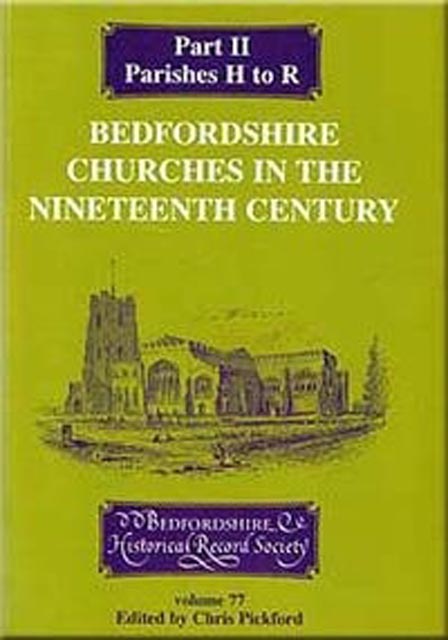Introduction to the Volume
Published online by Cambridge University Press: 05 August 2023
Summary
The Bedfordshire Churches series
This is the second in a series of three volumes covering Bedfordshire churches in the nineteenth century. It contains descriptions of churches “on the eve of restoration” together with contemporary illustrations. It deals with parishes from Harlington to Roxton.
In addition to the analytical index to all three parts, the third volume (due for publication as Vol.79 in 2000) will also contain:
1. Information on new churches and churches in the present county otherwise excluded from the survey
2. An appendix summarising the main stages of Cl9th restoration for each church
3. Addenda and Corrigenda for Parts I and II (none will be given in part II)
The sources
For each church, there are extracts from original records amplified by a commentary and explanatory footnotes. The main source material consists of:
1. Extracts from church inventories - mainly 1822
2. Antiquarian notes on churches by Archdeacon Bonney, c.1840
3. Archdeacon Bonney's visitation notebooks 1823-1839
4. Articles on churches by W.A. (John Martin, the librarian at Woburn Abbey) 1845-1854
5. Church descriptions by Sir Stephen Glynne 1830-1870
These sources are described in greater detail in the first volume in the series, BHRS Vol.73 (1994) pp.1-25
The text of the contemporary sources is presented in its original form, to convey a feeling for the times as well as to provide information. Most of the sources could have been condensed by editing but the Society's Editorial Group felt that they should nevertheless be published in extenso.
The commentary and footnotes
The introductory commentary for each church includes a brief history of the building, with special reference to eighteenth and nineteenth century restoration and alterations. Detailed footnotes explain and amplify features mentioned in the text.
The illustrations are drawn chiefly from the Record Office collection. They include early watercolours and photographs of the churches as they appeared - sometimes in advanced stages of neglect and decay - before the arrival of the Victorian restorers. Where they exist, pre-restoration interior views have been used.
The background research for the commentaries and footnotes has involved investigation of a wide range of sources.
- Type
- Chapter
- Information
- Bedfordshire Churches in the Nineteenth Century , pp. xiii - xivPublisher: Boydell & BrewerFirst published in: 2023



